Ofafa Jericho's Calvins Were (right) attempts to stop Charles Odhiambo of Dagoretti High School during their Schools Games rugby match at Upper Hill High School on March 13, 2020.
| Sila Kiplagat | Nation Media GroupTalkUP!
Premium
Sports stardom starts in schools but 2020 calendar is ruined
What you need to know:
- Not without some trepidation, Orero is looking forward to the resumption of the sports calendar next year.
- There is no telling how many students won’t return and what will become of them.
- There will be no going back to the old ways because the costs are now abundantly clear.
The beginning of stardom in sport is the school. Here is where talent is identified and developed.
The task is laborious and fraught with many frustrations that draw from the teacher all the age-old virtues needed for success: patience, persistence, faith and hope.
Guardianship’s true meaning, love and care, selflessness and joy at another person’s success, find their highest expression in this space in time where age is great asset – but a fragile one.
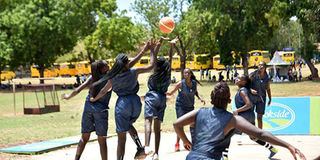
Mua Girls High School basketball players train on the eve of the Brookside Kenya Secondary Schools Sports Association (KSSSA) National Term One Games at Shimo la Tewa Secondary School in Mombasa on April 8, 2019.
Hamstrung by dwindling incomes and social pressures to meet the unforgiving expectations of family and community, the school is where parents are sometimes forced to outsource the responsibility of raising their loved ones into good and productive people.
When success is achieved, some are quick to claim the credit and when there is failure, they pass swift judgment and apportion blame.
Not always but not uncommon. As sport goes, the school is the starting point of life, the foundation phase from where the future sprouts. What we see outside its enclosure comes already made.
In 2020, the school was devastated. The teacher is supposed to know everything but for this once, there were no answers. The teacher, too, did not know. The school went into indefinite closure and the destruction of futures set in.
“We provide the national teams for all age groups under 20,” Peter Orero, the chairman of the Kenya Secondary Schools Sports Association, told me this week. "We have lost the year 2020. Once schools reopen in January, we shall sit to draw the 2021 calendar. We shall have no way of returning the ages of the competitors to them.”
He added: “One year is a very long time in talent development. The effects of the Covid-19 pandemic will haunt us for a long time to come. We have lost one generation of competitors. It is devastating.”
Quantifying the losses is a tall order. From a financial point of view, it is possible to calculate the lost sponsorship money.
The annual calendar of KSSSA is underwritten by Brookside Dairies to the tune of millions of shillings. They upgrade the sports facilities of the schools where the competitions take place. They provide kit and prizes and underwrite all travel and accommodation costs.
Some of the winning students, those who attain a score of B+ and above in the KSCE examinations, get sponsorship to Strathmore University.
“What is impossible to quantify is the immaterial losses,” says Mr Orero. “How do you quantify the shattered dreams of students who have been denied the chance of a lifetime? The future careers of many students are anchored in success in the school sports programme. This applies both to them and their teachers."
“The widespread cases of depression we now see are not just with the students but teachers as well. As a matter of fact, it would seem that teachers are even more affected than their students. Many are in need of counselling services. But this is left to schools and the affected individuals to figure how to deal with it.”
When the pandemic struck, Kakamega High School was gearing to host the big draw event of the year – the 2020 Federation of East Africa Secondary School Sports Association’s (FEASSSA) Games in August.
The event was scrapped and a new date, August 2021 was set – and just like that, all competitors who were at the limit of their age groups had their plans of progression dissipate.
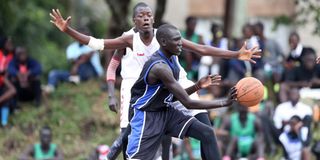
Nairobi schools' Jacob Aleu (with the ball) is guarded by Langata High School's Darel Opiyo during their Schools Games basketball match at State House Girls High School on March 13, 2020.
Last month, the 2020 World School Games would have taken place in Jinjiang, China.
This was going to be the first time that Kenya would participate in the event and Orero laments the loss of such a big platform for many youngsters. Who knows what doors it would have opened for them? The 2020 World Games have now been rescheduled to October 2021.
Not without some trepidation, Orero is looking forward to the resumption of the sports calendar next year. There is no telling how many students won’t return and what will become of them.
“Sports is one of the biggest enablers of discipline in school life,” he observes.
“Our partnerships have grown steadily over the years, giving our students and their teachers expanded opportunities to showcase their talents. Our national school sports system now has linkages to the regional, continental and global levels. And we are well supported in sponsorship. But the pandemic is here and life must go on. We shall emerge stronger and with good lessons learnt.”
The lasting culture change from the pandemic is the introduction and enforcement of strict health protocols in learning institutions. There will be no going back to the old ways because the costs are now abundantly clear.
******
After listening to Peter Orero talking about the psychological strains imposed on teachers and students by the Covid-19 pandemic, I retreated to my study and remembered James Poole.
As a teenager transitioning to young adult with hopes of making a career in sports journalism, he was my mentor.
He was a teacher by profession and the father figure who convinced me that things can always get worse than they are now. Don’t dwell too hard on that for which you can’t find an answer, he would tell me, get a good night’s sleep and tomorrow will be better.
I tried to do as he said while inwardly doubting him. But he always turned out right and the end that seemed nigh every so often to my young, troubled mind didn’t materialise.
Poole was an American Peace Corps worker who had come to Kenya in the late 70s.
Coached basketball
Among other activities he coached basketball at the YMCA Shauri Moyo in Nairobi. My friend Hos Maina, the great photojournalist who was tragically killed in Somalia while on duty for Reuters in 1993, introduced him to me.
Watching Poole take students through their paces at YMCA Shauri Moyo, listening to him talk about life and basketball, telling them what glorious careers they stood to make in America, the Mecca of the sport, and sharing cups of tea with him in restaurants in the evenings made me appreciate the meaning of the term mentor.
He occupied my mind this week as I thought about the lot of teachers worrying for their students and themselves in a time of a pandemic that has felled the weak and the strong, the rich and the poor, the educated and the illiterate, the religious and the atheist, the good and the bad.
When he came into my life, Poole turned out to be the only person I could open up to completely and not regret afterwards. I told him everything that was happening to me. I had never met such a good listener. And he listened with empathy. He was patient. He even tolerated my temper.
Through him, I learned about the healing power of a no-strings-attached conversation. I learnt that complete restoration is just a secure shoulder to lean on away. And life became worth living.
I took away many lessons from him but the most important one was that the most precious asset one has is sound mental health. It is the difference between a good and bad life, whatever one’s circumstances.
The shadows of death are never far away from somebody afflicted by poor mental health while no problems exist for a well-adjusted person, only challenges to overcome.
Stigma
In my experience, our country reserves its severest stigma for people with visible mental health problems. But you don’t even have to get there to become severely handicapped in your daily undertakings by below-par mental well-being.
This is the lot of many Kenyans and 2020 has tried them in extreme. The bad news, of course, is that the end is not yet in sight. In all my life, I have never felt collective angst as I have felt this year.
Economic collapse is now an accomplished fact in many households. Social unraveling, attested to by such occurrences as rises cases of teenage pregnancies, accelerated in 2020.
And worst of all, death. Personally, I have lost people very close to me, and people I care for have lost people very close to them. I have observed with a benumbing sense of resignation how the subject of mortality has inserted itself in our everyday conversations. Everybody seems to know somebody who has died.
My hope is that as a New Year starts in a few days, our country will find it in her to make the soon-to-be-expected vaccine accessible to every citizen without letting them die because they can’t afford it.
Covid-19 has created a handful of millionaires and that is their luck. But the Government should put all stops to ensure life returns to normal as soon as humanly possible. People are useful when healthy and alive, not dead.
******
I am at a loss about which countries Covid-19 has selected to ravage and which it has generally spared. Since mid-March, our schools have remained closed. Down south, our testy neighbours, Tanzania, kept theirs open. I have good contacts there and people tell me life has been going on normally; no reports of people falling off their feet in the streets.
On August 22, Tanzanian club champions Simba SC held huge celebrations to mark Simba Day 2020. The stands of the Benjamin Mkapa Stadium were packed to the rafters as Bongo star artist Diamond Platnumz brought the house down for the unmasked 60,000 fans packed in.
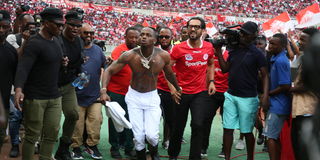
Bongo star artist Diamond Platnumz (shirtless) entertains Simba fans with club owner Mohammed Dewji in tow during a colourful ceremony dubbed "Simba Day" at the Benjamin Mkapa Stadium in Dar es Salaam on August 22, 2020.
Meanwhile, Kenya was under a total lockdown and social distancing was the catchphrase. And people were still dying.
In this column on August 29, I marveled: “If anyone had any doubts that Kenya football is on its deathbed while that of our neighbours in Tanzania is headed for the stratosphere, last Saturday’s Simba Day celebrations were your answer."
The contrast between the two countries is as stark as day and night. Kenya is grappling with a crises of item one of all the basic things needed to be able to play football: lack of playing surfaces. Meanwhile, down south, sights have been set on the Africa Champions League – and the leaders there are dead serious. Amid the gargantuan celebrations at Dar es Salaam’s Benjamin Mkapa Stadium, Simba owner Mohammed Dewji declared:
"I am not satisfied with only domestic success. My target is the African championship. Our main aim is to continue fighting and competing for the Champions League title. But reaching the group stage of the competition is, of course, our first priority.”
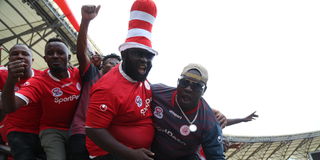
Simba fans cheer their team at the Benjamin Mkapa Stadium in Dar es Salaam during a colourful ceremony dubbed "Simba Day" on August 22, 2020.
Why such a massive difference in the effects of the pandemic between two neighbouring countries? Who knows the answer to this question?
Have safe holidays and this time, Happy New Year is not a routine greeting to mark the first day of the calendar. It is a very fervent wish.
Roy Gachuhi is a former Nation Media Group sports reporter. Email: [email protected]. www.roygachuhi.com




